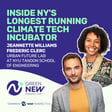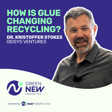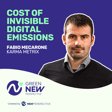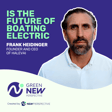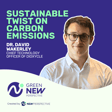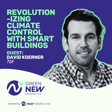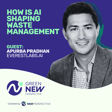
AI’s Role in Climate Tech: Podcast With Climactic
Raj Kapoor, co-founder of Climactic, takes us through his journey from engineering to entrepreneurship and how he found his way into climate tech investing.
He talks about Climactic’s unique approach, focusing on early-stage investments and software solutions that help businesses reach net zero by improving efficiency.
Raj also shares his thoughts on the challenges climate tech companies face, especially with AI, and gives some practical advice for anyone looking to make a real difference in this space.
Guest: Raj Kapoor, Co-Founder & Managing Partner at Climactic
📚 Follow Climactic:
━━━━━━━━━━━━━━
- Website: https://www.climactic.vc/
- LinkedIn: https://www.linkedin.com/company/climacticvc/
🎧 Subscribe to our podcast:
━━━━━━━━━━━━━
- Spotify: https://bit.ly/3PSWIyI
- Apple Podcasts: https://bit.ly/3RvlHte
- Youtube: https://bit.ly/3RDzkXg
- Deezer: https://bit.ly/3PvQaof
- Amazon Music: https://bit.ly/3PQlijS
- Zencastr: https://bit.ly/48xt75s
💬 Follow GNP podcast on social media:
━━━━━━━━━━━━━
- Instagram: https://www.instagram.com/greennewperspective/
- LinkedIn: https://www.linkedin.com/company/new-perspective-marketing/
- Facebook: https://www.facebook.com/greennewperspective
- TikTok: https://www.tiktok.com/@greennewperspective
🌍 Cleantech podcast created by New Perspective Marketing
━━━━━━━━━━━━━━━━━━━━━━━━━━━
This podcast is proudly sponsored by New Perspective Marketing, a dynamic growth marketing agency in Boston, MA, celebrating 20 years in business. We help sustainably focused B2B organizations grow their brands and scale up revenue. If you or your organization is looking to grow, visit https://www.npws.com for more info.
💚 GNP Team:
━━━━━━
- Host & Co-Producer: Dunja Jovanovic
- Executive Producer: Marko Bodiroza
- Creator: Nathan Harris
- Video Editor & Content: Marija Davidoski

